Middlesbrough (UK Parliament constituency)
Middlesbrough is a parliamentary constituency in the United Kingdom,[n 1] recreated in 1974, and represented since 2012 in the House of Commons of the UK Parliament by Andy McDonald from the Labour Party.[n 2] An earlier version of the seat existed between 1868 and 1918.
| Middlesbrough | |
|---|---|
| Borough constituency for the House of Commons | |
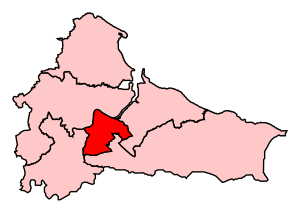 Boundary of Middlesbrough in North Yorkshire | |
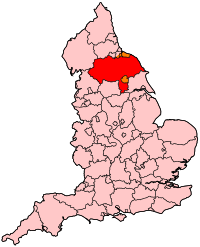 Location of North Yorkshire within England | |
| County | North Yorkshire |
| Electorate | 59,744 (2018)[1] |
| Current constituency | |
| Created | 1974 |
| Member of Parliament | Andy McDonald (Labour) |
| Number of members | One |
| Created from | Middlesbrough East and Middlesbrough West |
| 1868–1918 | |
| Number of members | One |
| Type of constituency | Borough constituency |
| Replaced by | Middlesbrough East and Middlesbrough West |
| Created from | North Riding of Yorkshire |
History
- First creation
Parliament created this seat under the Representation of the People Act 1867 for the general election the next year, however the population expanded so was split into east/west areas in 1918. From 1950 until 1974, given intervening expansion of suburbs across the country, the Metropolitan Borough of Thornaby closer to Stockton on Tees was included in the Middlesbrough West constituency. Thornaby was enveloped into Teesside County Borough from 1974 and has not been part of the associated seats otherwise.[2]
- Second creation – current
The seat was recreated on similar boundaries to those which existed immediately before 1918.
- Results of the winning party
The 2015 result made the seat the 36-safest of Labour's 232 seats by percentage of majority.[3]
Since the constituency's re-creation in 1974, Middlesbrough has elected the Labour Party's candidate as its MP.[n 3] In areas formerly part of Middlesbrough East, the MP has been Labour since 1950.[n 4]
Middlesbrough West took in rural and semi-rural areas outside the borough to the west, and was a marginal seat passing three times between the two largest parties after the Second World War, but a Liberal stronghold from 1918 until 1945; former soldier and iron and steel merchant Trevelyan Thomson ran unopposed at the polls for re-election in 1924.
- Opposition parties
The 2012 by-election and 2015 general election saw UKIP finish second.[4] The Liberal Democrats fielded second-placed candidates in 2005 and 2010. The Conservatives did in all elections between the seat's revival and 2001, and returned to second place in 2017. The Green Party outpolled the Liberal Democrats in 2015 in a field of five parties' candidates standing — the two parties failed to achieve 5% of votes cast leading them to forfeit their deposits.
- Turnout
Turnout has ranged between 70.1% in 1987 and 48.8% in 2005.
Boundaries
1868–1885: The township of Linthorpe, and so much of the townships of Middlesbrough, Ormesby, and Eston as lie to the north of the road leading from Eston towards Yarm.[5]
1974–1983: The County Borough of Teesside wards of Berwick Hills, Marton, North Ormesby, St Hilda's, Thorntree, and Tollesby.
1983–1997: The Borough of Middlesbrough wards of Acklam, Beckfield, Beechwood, Berwick Hills, Gresham, Grove Hill, Kirby, Linthorpe, North Ormesby, Pallister, Park, St Hilda's, Southfield, Thorntree, and Westbourne.
1997–2010: The Borough of Middlesbrough wards of Acklam, Ayresome, Beckfield, Beechwood, Berwick Hills, Brookfield, Gresham, Grove Hill, Kader, Kirby, Linthorpe, North Ormesby, Pallister, Park, St Hilda's, Southfield, Thorntree, and Westbourne.
2010–present: The Borough of Middlesbrough wards of Acklam, Ayresome, Beckfield, Beechwood, Brookfield, Clairville, Gresham, Kader, Grove Hill, Linthorpe, Middlehaven, North Ormesby and Brambles Farm, Pallister Park, Thorntree, and University.
The boundaries of the constituency are loosely based on the pre-1968 County Borough of Middlesbrough boundaries, which is now defined as the Borough (or Town) of Middlesbrough; the exclusions are its Easterside and Park End Wards, instead in Middlesbrough South and East Cleveland.
Constituency profile
The constituency is mostly the urban city itself, largely in the sunset of its once world-leading steelmaking output. It suffers high unemployment and its adult population has mostly a low income; however, with modern advanced engineering, design and tourism, the city forms with nearby Redcar a bellwether for the North East region's economy firmly in the British forefront of a determined return to increasing national output.[6] In November 2012, male and female unemployment (based on the more up-to-date claimant statistics) placed Middlesbrough topmost of 29 constituencies in the region, well ahead for example the City of Durham at the bottom of the list, with just 3.4% claimants whereas this area had 9.4% claimants.[7]
In terms of housing stock, the authority is one of few authorities to see the proportion of detached and semi-detached homes increase (to 13.6% and 39.9%), in this instance this was coupled with a similar rise in flats to 11.9%, all at a loss to the share of terraced properties, down 4.7%.[8]
2010 general election
The film ToryBoy The Movie followed the election, directed by and starring John Walsh who documented how he became a candidate for the Conservative Party in Middlesbrough, challenging the sitting MP, Stuart Bell.[9][10] The following year, the Daily Mail claimed that long-term sitting MP Bell had not held a constituency surgery since 1997.[11] Later in 2011, Neil Macfarlane, in a report for local newspaperTeesside Gazette, asked "Are Teessiders getting enough from Sir Stuart Bell?" when he failed to answer over one hundred telephone calls made to his constituency office over a three-month period.[12] The Gazette story was picked up by national newspapers. The Independent asked "is Sir Stuart Bell Britain's laziest MP?"[13][14] The Guardian fact-checked the "laziest MP" claims and found that was false.[15] The Labour Party said it was looking into the allegations.[14][16] Bell later said that he had stopped surgeries after being assaulted, and was willing to meet constituents "by appointment". He stated that he would discuss the matter with Labour Chief Whip Rosie Winterton, and would be writing to Labour Party leader Ed Miliband to explain his circumstances.[17]
Members of Parliament
MPs 1868–1918
| Year | Member[18] | Whip | |
|---|---|---|---|
| 1868 | Henry Bolckow | Liberal | |
| 1878 | Isaac Wilson | ||
| 1892 | Havelock Wilson | ||
| 1900 | Samuel Sadler | Conservative | |
| 1906 | Havelock Wilson | Liberal | |
| 1910 | Penry Williams | ||
| 1918 | constituency abolished | ||
MPs since 1974
| Election | Member[18] | Party | |
|---|---|---|---|
| Feb 1974 | Arthur Bottomley | Labour | |
| 1983 | Stuart Bell | ||
| 2012 by-election | Andy McDonald | ||
Elections
Elections in the 2010s
| Party | Candidate | Votes | % | ± | |
|---|---|---|---|---|---|
| Labour | Andy McDonald | 17,207 | 50.5 | –15.2 | |
| Conservative | Ruth Betson | 8,812 | 25.8 | -0.9 | |
| Independent | Antony High | 4,548 | 13.3 | N/A | |
| Brexit Party | Faye Clements | 2,168 | 6.4 | N/A | |
| Liberal Democrats | Thomas Crawford | 816 | 2.4 | +1.5 | |
| Green | Hugh Alberti | 546 | 1.6 | +0.6 | |
| Majority | 8,390 | 24.7 | –14.3 | ||
| Turnout | 34,097 | 56.1 | –2.2 | ||
| Labour hold | Swing | -7.2 | |||
| Party | Candidate | Votes | % | ± | |
|---|---|---|---|---|---|
| Labour | Andy McDonald | 23,404 | 65.7 | +8.9 | |
| Conservative | Jacob Young | 9,531 | 26.7 | +10.3 | |
| UKIP | David Hodgson | 1,452 | 4.1 | -14.6 | |
| Independent | Terry Lawton | 632 | 1.8 | N/A | |
| Liberal Democrats | Dawud Islam | 368 | 1.0 | -2.7 | |
| Green | Carl Martinez | 250 | 0.7 | -3.6 | |
| Majority | 13,873 | 39.0 | +0.9 | ||
| Turnout | 35,637 | 58.3 | +5.4 | ||
| Labour hold | Swing | −0.7 | |||
| Party | Candidate | Votes | % | ± | |
|---|---|---|---|---|---|
| Labour | Andy McDonald | 18,584 | 56.8 | +10.9 | |
| UKIP | Nigel Baker | 6,107 | 18.7 | +15.0 | |
| Conservative | Simon Clarke | 5,388 | 16.5 | -2.3 | |
| Green | Hannah Graham | 1,407 | 4.3 | N/A | |
| Liberal Democrats | Richard Kilpatrick | 1,220 | 3.7 | −16.2 | |
| Majority | 12,477 | 38.1 | +12.1 | ||
| Turnout | 32,706 | 52.9 | +1.5 | ||
| Labour hold | Swing | −2.0 | |||
| Party | Candidate | Votes | % | ± | |
|---|---|---|---|---|---|
| Labour | Andy McDonald | 10,201 | 60.5 | +14.6 | |
| UKIP | Richard Elvin | 1,990 | 11.8 | +8.1 | |
| Liberal Democrats | George Selmer | 1,672 | 9.9 | −10.0 | |
| Conservative | Ben Houchen | 1,063 | 6.3 | −12.5 | |
| Peace | Imdad Hussain | 1,060 | 6.3 | N/A | |
| BNP | Peter Foreman | 328 | 1.9 | −3.9 | |
| TUSC | John Malcolm | 277 | 1.6 | N/A | |
| Independent | Mark Heslehurst | 275 | 1.6 | N/A | |
| Majority | 8,211 | 48.7 | +22.7 | ||
| Turnout | 16,866 | ||||
| Labour hold | Swing | – | |||
| Party | Candidate | Votes | % | ± | |
|---|---|---|---|---|---|
| Labour | Stuart Bell | 15,351 | 45.9 | N/A | |
| Liberal Democrats | Chris Foote-Wood | 6,662 | 19.9 | N/A | |
| Conservative | John Walsh | 6,283 | 18.8 | N/A | |
| Independent | Joan McTigue | 1,969 | 5.9 | N/A | |
| BNP | Michael Ferguson | 1,954 | 5.8 | N/A | |
| UKIP | Robert Parker | 1,236 | 3.7 | N/A | |
| Majority | 8,689 | 26.0 | N/A | ||
| Turnout | 33,455 | 51.4 | N/A | ||
| Labour win (new boundaries) | |||||
Elections in the 2000s
| Party | Candidate | Votes | % | ± | |
|---|---|---|---|---|---|
| Labour | Stuart Bell | 18,562 | 57.8 | −9.8 | |
| Liberal Democrats | Joe Michna | 5,995 | 18.7 | +8.3 | |
| Conservative | Caroline Flynn-Macleod | 5,263 | 16.4 | −2.7 | |
| BNP | Ron Armes | 819 | 2.5 | N/A | |
| UKIP | Michael Landers | 768 | 2.4 | N/A | |
| Independent | Jackie Elder | 503 | 1.6 | N/A | |
| Independent | Derrick Arnott | 230 | 0.7 | N/A | |
| Majority | 12,567 | 39.1 | -9.4 | ||
| Turnout | 32,140 | 48.8 | −1.0 | ||
| Labour hold | Swing | −9.0 | |||
| Party | Candidate | Votes | % | ± | |
|---|---|---|---|---|---|
| Labour | Stuart Bell | 22,783 | 67.6 | −3.9 | |
| Conservative | Alex Finn | 6,453 | 19.1 | +2.0 | |
| Liberal Democrats | Keith Miller | 3,512 | 10.4 | +1.9 | |
| Socialist Alliance | Geoffrey Kerr-Morgan | 577 | 1.7 | N/A | |
| Socialist Labour | Kai Andersen | 392 | 1.2 | N/A | |
| Majority | 16,330 | 48.5 | -5.7 | ||
| Turnout | 33,717 | 49.8 | −15.2 | ||
| Labour hold | Swing | ||||
Elections in the 1990s
| Party | Candidate | Votes | % | ± | |
|---|---|---|---|---|---|
| Labour | Stuart Bell | 32,925 | 71.4 | N/A | |
| Conservative | Liam Benham | 7,907 | 17.2 | N/A | |
| Liberal Democrats | Alison Charlesworth | 3,934 | 8.5 | N/A | |
| Referendum | Robert Edwards | 1,331 | 2.9 | N/A | |
| Majority | 25,018 | 54.2 | N/A | ||
| Turnout | 65.0 | N/A | |||
| Labour win (new boundaries) | |||||
| Party | Candidate | Votes | % | ± | |
|---|---|---|---|---|---|
| Labour | Stuart Bell | 26,343 | 64.1 | +4.4 | |
| Conservative | Paul R. Rayner | 10,559 | 25.7 | +0.7 | |
| Liberal Democrats | Rosamund Jordan | 4,201 | 10.2 | −5.1 | |
| Majority | 15,784 | 38.4 | +3.7 | ||
| Turnout | 41,103 | 69.8 | −1.1 | ||
| Labour hold | Swing | +1.9 | |||
Elections in the 1980s
| Party | Candidate | Votes | % | ± | |
|---|---|---|---|---|---|
| Labour | Stuart Bell | 25,747 | 59.7 | ||
| Conservative | Robert Orr-Ewing | 10,789 | 25.0 | ||
| Liberal | Philip Hawley | 6,594 | 15.3 | ||
| Majority | 14,958 | 34.7 | |||
| Turnout | 71.0 | ||||
| Labour hold | Swing | ||||
| Party | Candidate | Votes | % | ± | |
|---|---|---|---|---|---|
| Labour | Stuart Bell | 21,220 | 50.7 | N/A | |
| Conservative | L.H. Campey | 11,551 | 27.6 | N/A | |
| Liberal | A.D. Sanders | 8,871 | 21.2 | N/A | |
| Workers Revolutionary | M.A. Simpson | 207 | 0.5 | N/A | |
| Majority | 9,669 | 23.1 | N/A | ||
| Turnout | 66.4 | N/A | |||
| Labour win (new boundaries) | |||||
Elections in the 1970s
| Party | Candidate | Votes | % | ± | |
|---|---|---|---|---|---|
| Labour | Arthur Bottomley | 24,872 | 56.2 | ||
| Conservative | C Fenwick | 13,463 | 30.4 | ||
| Liberal | Peter Freitag | 4,023 | 9.1 | ||
| Workers Revolutionary | M Simpson | 1,018 | 2.3 | ||
| Independent Labour | J Wilcox | 861 | 2.0 | ||
| Majority | 11,409 | 25.8 | |||
| Turnout | 67.9 | ||||
| Labour hold | Swing | ||||
| Party | Candidate | Votes | % | ± | |
|---|---|---|---|---|---|
| Labour | Arthur Bottomley | 22,791 | 61.8 | ||
| Conservative | Edward Leigh | 8,984 | 24.4 | ||
| Liberal | Chris Foote Wood | 5,080 | 13.8 | ||
| Majority | 13,807 | 37.4 | |||
| Turnout | 61.2 | ||||
| Labour hold | Swing | ||||
| Party | Candidate | Votes | % | ± | |
|---|---|---|---|---|---|
| Labour | Arthur Bottomley | 27,324 | 66.3 | N/A | |
| Conservative | Geoffrey Dickens | 13,915 | 33.7 | N/A | |
| Majority | 13,409 | 32.6 | N/A | ||
| Turnout | 41,239 | 69.4 | N/A | ||
| Labour win (new seat) | |||||
Elections in the 1910s
General Election 1914/15:
A General Election was required to take place before the end of 1915. The political parties had been making preparations for an election to take place and by the July 1914, the following candidates had been selected;
- Liberal:Penry Williams
- Unionist:
| Party | Candidate | Votes | % | ± | |
|---|---|---|---|---|---|
| Liberal | Penry Williams | 10,313 | 61.1 | +10.6 | |
| Conservative | Thomas Gibson Poole | 6,568 | 38.9 | +3.6 | |
| Majority | 3,745 | 22.2 | +7.0 | ||
| Turnout | 16,881 | 77.6 | −10.4 | ||
| Registered electors | 21,756 | ||||
| Liberal hold | Swing | +3.5 | |||

| Party | Candidate | Votes | % | ± | |
|---|---|---|---|---|---|
| Liberal | Penry Williams | 9,670 | 50.5 | -2.1 | |
| Conservative | Arthur Charles Dorman | 6,756 | 35.3 | -3.7 | |
| Labour | Patrick Walls | 2,710 | 14.2 | N/A | |
| Majority | 2,914 | 15.2 | +1.6 | ||
| Turnout | 19,136 | 88.0 | +1.3 | ||
| Registered electors | 21,756 | ||||
| Liberal hold | Swing | +0.8 | |||
Elections in the 1900s
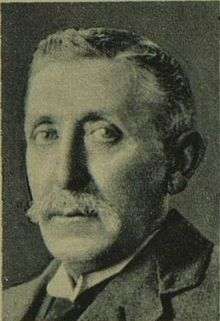
| Party | Candidate | Votes | % | ± | |
|---|---|---|---|---|---|
| Lib-Lab | Havelock Wilson | 9,271 | 52.6 | +2.8 | |
| Conservative | Samuel Sadler | 6,864 | 39.0 | -11.2 | |
| Independent Labour | George Lansbury | 1,484 | 8.4 | N/A | |
| Majority | 2,407 | 13.6 | N/A | ||
| Turnout | 17,619 | 86.7 | +8.9 | ||
| Registered electors | 20,322 | ||||
| Lib-Lab gain from Conservative | Swing | +7.0 | |||
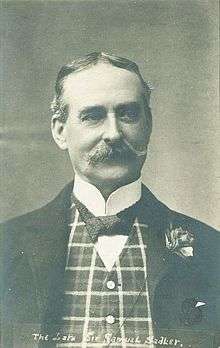
| Party | Candidate | Votes | % | ± | |
|---|---|---|---|---|---|
| Conservative | Samuel Sadler | 6,760 | 50.2 | +9.0 | |
| Lib-Lab | Havelock Wilson | 6,705 | 49.8 | −9.0 | |
| Majority | 55 | 0.4 | N/A | ||
| Turnout | 13,465 | 77.8 | +1.6 | ||
| Registered electors | 17,307 | ||||
| Conservative gain from Liberal Labour (UK) | Swing | +9.0 | |||
Elections in the 1890s
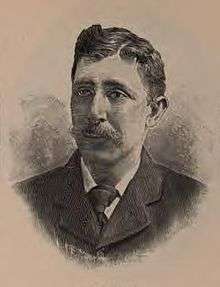
| Party | Candidate | Votes | % | ± | |
|---|---|---|---|---|---|
| Lib-Lab | Havelock Wilson | 6,755 | 58.8 | +25.2 | |
| Conservative | Samuel Sadler | 4,735 | 41.2 | +13.6 | |
| Majority | 2,020 | 17.6 | N/A | ||
| Turnout | 11,490 | 76.2 | -3.4 | ||
| Registered electors | 15,077 | ||||
| Lib-Lab gain from Independent Labour | Swing | N/A | |||
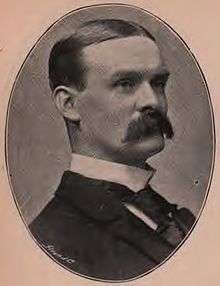
| Party | Candidate | Votes | % | ± | |
|---|---|---|---|---|---|
| Independent Labour | Havelock Wilson | 4,691 | 38.8 | N/A | |
| Liberal | William Robson | 4,062 | 33.6 | N/A | |
| Liberal Unionist | Hugh Bell | 3,333 | 27.6 | N/A | |
| Majority | 629 | 5.2 | N/A | ||
| Turnout | 12,086 | 79.6 | N/A | ||
| Registered electors | 15,192 | ||||
| Independent Labour gain from Liberal | Swing | N/A | |||
Elections in the 1880s
| Party | Candidate | Votes | % | ± | |
|---|---|---|---|---|---|
| Liberal | Isaac Wilson | Unopposed | |||
| Liberal hold | |||||
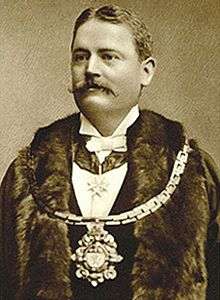
| Party | Candidate | Votes | % | ± | |
|---|---|---|---|---|---|
| Liberal | Isaac Wilson | 6,961 | 63.3 | +1.6 | |
| Conservative | Raylton Dixon | 4,035 | 36.7 | +14.5 | |
| Majority | 2,926 | 26.6 | −12.9 | ||
| Turnout | 10,996 | 79.3 | +10.6 | ||
| Registered electors | 13,864 | ||||
| Liberal hold | Swing | -6.5 | |||
| Party | Candidate | Votes | % | ± | |
|---|---|---|---|---|---|
| Liberal | Isaac Wilson | 4,515 | 61.7 | +2.3 | |
| Conservative | Samuel Sadler | 1,626 | 22.2 | +6.3 | |
| Lib-Lab | Edward Dillon Lewis[37] | 1,171 | 16.0 | −8.6 | |
| Majority | 2,889 | 39.5 | +4.7 | ||
| Turnout | 7,312 | 68.7 | -1.9 | ||
| Registered electors | 10,641 | ||||
| Liberal hold | Swing | +2.4 | |||
Elections in the 1870s
| Party | Candidate | Votes | % | ± | |
|---|---|---|---|---|---|
| Liberal | Isaac Wilson | 5,307 | 68.7 | +9.3 | |
| Conservative | Samuel Sadler | 2,415 | 31.3 | +6.7 | |
| Majority | 2,892 | 37.5 | +2.7 | ||
| Turnout | 7,722 | 65.3 | -5.3 | ||
| Registered electors | 11,824 | ||||
| Liberal hold | Swing | +1.4 | |||
- Caused by Bolckow's death.
| Party | Candidate | Votes | % | ± | |
|---|---|---|---|---|---|
| Liberal | Henry Bolckow | 3,719 | 59.4 | N/A | |
| Lib-Lab | John Kane | 1,541 | 24.6 | N/A | |
| Conservative | William Randolph Innes Hopkins[38] | 996 | 15.9 | N/A | |
| Majority | 2,178 | 34.8 | N/A | ||
| Turnout | 6,256 | 70.6 | N/A | ||
| Registered electors | 8,862 | ||||
| Liberal hold | Swing | N/A | |||
Elections in the 1860s
| Party | Candidate | Votes | % | ± | |
|---|---|---|---|---|---|
| Liberal | Henry Bolckow | Unopposed | |||
| Registered electors | 5,196 | ||||
| Liberal win (new seat) | |||||
Notes and references
- Notes
- A borough constituency (for the purposes of election expenses and type of returning officer)
- As with all constituencies, the constituency elects one Member of Parliament (MP) by the first past the post system of election at least every five years.
- Middlesbrough was revived for the February 1974 general election
- Middlesbrough East contributed more than half of its former area to the modern boundaries (as variously drawn after 1974)
- References
- "England Parliamentary electorates 2010–2018". Boundary Commission for England. Retrieved 23 March 2019.
- Thornaby MB – units covering this place A Vision of Britain history website; University of Portsmouth and others. Retrieved 17 April 2017
- List of Labour MPs elected in 2015 by % majority UK Political.info. Retrieved 29 January 2017
- "General Election Results from the Electoral Commission".
- "Representation of the People Act 1867" (PDF). Retrieved 23 May 2020.
- Constituency Profile The Guardian
- Unemployment statistics The Guardian
- "2011 census interactive maps". Archived from the original on 29 January 2016.
- "No surgeries for 14 years - is Sir Stuart Bell Britain's laziest MP?". 8 September 2011.
- "Are Teessiders getting enough from Sir Stuart Bell?". 6 September 2011.
- Walters, Simon; Wilkinson, Paul (13 February 2011). "Labour veteran hasn't held voters' surgery for 14 years: Mother is snubbed 40 times by MP who says 'I haven't let people down'". Daily Mail. Retrieved 13 December 2019.
- gazettelive Administrator (6 September 2011). "Are Teessiders getting enough from Sir Stuart Bell?". gazettelive.
- Jonathan Brown No surgeries for 14 years – is Sir Stuart Bell Britain's laziest MP?, Independent, 7 September 2011
- Richard Moss Middlesbrough MP Sir Stuart Bell fights laziest MP tag, BBC, 9 September 2011
- Polly Curtis (8 September 2011). "Reality check: Who are Britain's laziest parliamentarians?". The Guardian.: "Bell has been an MP for nearly 30 years and has had a distinguished career in parliament as a frontbench spokesman on trade and industry in opposition and the spokesman for the Church of England in the House of Commons and member of the House of Commons commission until last year. He's part of a breed of politicians – also including the Tory Edward Leigh and Labour's Gerald Kaufman – who have been extremely active parliamentarians but not always maintained an office in their constituency. One measure of their parliamentary work is the proportion of votes they turn up to."
- gazettelive Administrator (8 September 2011). "Labour launches probe into Middlesbrough MP". gazettelive.
- Fernandez, Colin (8 September 2011). "Is this Britain's laziest MP? Labour veteran who claims £83,000 for staff but hasn't held a constituency surgery for 14 YEARS". London: Daily Mail. Retrieved 8 September 2011.
- Leigh Rayment's Historical List of MPs – Constituencies beginning with "M" (part 2)
- "Election of a Member of Parliament for Middlesbrough" (PDF). Middlesbrough Council. 15 November 2019. Retrieved 17 November 2019.
- "Election 2017: Middlesbrough". BBC. 17 May 2017. Retrieved 27 September 2018.
- "Election Data 2015". Electoral Calculus. Archived from the original on 17 October 2015. Retrieved 17 October 2015.
- "Election Data 2010". Electoral Calculus. Archived from the original on 26 July 2013. Retrieved 17 October 2015.
- "UK > England > North East > Middlesbrough". Election 2010. BBC. 7 May 2010. Retrieved 10 May 2010.
- "Election Data 2005". Electoral Calculus. Archived from the original on 15 October 2011. Retrieved 18 October 2015.
- "Election Data 2001". Electoral Calculus. Archived from the original on 15 October 2011. Retrieved 18 October 2015.
- "Election Data 1997". Electoral Calculus. Archived from the original on 15 October 2011. Retrieved 18 October 2015.
- "Election Data 1992". Electoral Calculus. Archived from the original on 15 October 2011. Retrieved 18 October 2015.
- "Politics Resources". Election 1992. Politics Resources. 9 April 1992. Archived from the original on 24 July 2011. Retrieved 6 December 2010.
- "Election Data 1987". Electoral Calculus. Archived from the original on 15 October 2011. Retrieved 18 October 2015.
- "Election Data 1983". Electoral Calculus. Archived from the original on 15 October 2011. Retrieved 18 October 2015.
- British Parliamentary Election Results 1885–1918, FWS Craig
- Debrett's House of Commons & Judicial Bench, 1916
- The Liberal Year Book, 1907
- Debrett's House of Commons & Judicial Bench, 1901
- Debrett's House of Commons & Judicial Bench, 1886
- Craig, F. W. S., ed. (1977). British Parliamentary Election Results 1832–1885 (e-book) (1st ed.). London: Macmillan Press. ISBN 978-1-349-02349-3.
- "Middlesbrough". Darlington & Stockton Times, Ripon & Richmond Chronicle. 20 March 1880. p. 5. Retrieved 4 December 2017 – via British Newspaper Archive.
- "Latest Market News". Newcastle Courant. 9 February 1874. p. 8. Retrieved 6 January 2018 – via British Newspaper Archive.
Sources
- Craig, F. W. S. (1989) [1977]. British parliamentary election results 1832–1885 (2nd ed.). Chichester: Parliamentary Research Services. ISBN 0-900178-26-4.
- Craig, F. W. S. (1989) [1974]. British parliamentary election results 1885–1918 (2nd ed.). Chichester: Parliamentary Research Services. ISBN 0-900178-27-2.